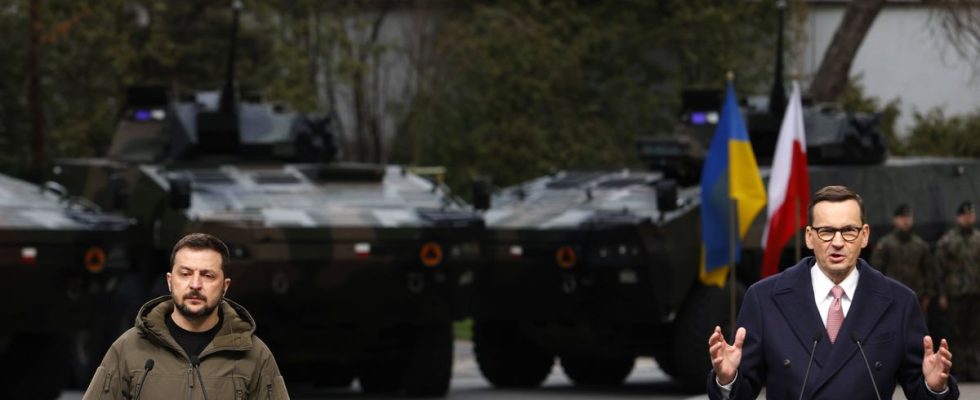Are Ukraine and Poland experiencing lasting disenchantment? The two countries are tearing each other apart over the issue of cereals, making a series of virulent declarations and, the culmination of this explosion of tensions, Warsaw announced on Wednesday evening that it would stop all shipments of weapons to Kiev. A gap now appears to separate Ukraine from its neighbor.
However, the Eastern European country has established itself as one of its staunchest allies from the start of the Russian invasion in February 2022. “Until now, Poland’s support has been unfailing », agrees Dorota Dakowska, professor of political science at Sciences po Aix, specialist in central and eastern Europe. Warsaw opened its arms and its borders wide, welcoming more than 15 million Ukrainians, of whom nearly 960,000 are officially refugees in Poland. The neighboring country has also “devoted 20% of its military budget to Ukraine”, recalls Dorota Dakowska.
The “fear of being Putin’s next victim”
By withdrawing arms deliveries to kyiv, Warsaw illustrates the extent of its discontent but also, implicitly, its concern. “We are mainly focusing on the modernization and rapid arming of the Polish army, so that it becomes one of the most powerful land armies in Europe, and this in a very short time,” explained the Prime Minister Polish Mateusz Morawiecki Thursday evening. By making these types of statements, the Law and Justice party (PiS) wants to show that it is “the only political force that can guarantee Poland’s security,” explains Pawel Zerka, researcher at the European Council on International Relations.
“There is a lot of nervousness on both sides. Ukraine is playing for its survival, obviously, and Poland is wondering if its army is ready. She is afraid of being Vladimir Putin’s next victim,” analyzes Dorota Dakowska. Last May, the discovery of a Russian Kh-55 cruise missile caused a political storm in the country. The Polish population is feverish, at the forefront of the despair of Ukrainians whose daily lives were wiped out overnight. However, the Polish government is particularly attentive to popular opinion.
Polish “electoralist thinking”
On October 15, parliamentary elections will be held which could call into question the majority of PiS, today in power. “The Polish government is experiencing a tension between strategic thinking, focused on Polish security, and electoral thinking,” notes Pawel Zerka, who worked in two think tanks Polish, demosEUROPA-Centre for European Strategy and WiseEuropa.
“Domestic politics plays a crucial role, the government could be forced to form a coalition with Confederation, a party even more far-right and even more nationalist,” adds Dorota Dakowska. In the hope of not letting power slip through its fingers, the Polish government is increasing its signals to dissatisfied voters. At their head are the farmers, whom the government is trying to protect.
A grain in the gear of support
In May, the European Union announced the end of the ban on imports of Ukrainian grain. So Poland as well as Slovakia and Hungary decided to implement unilateral embargoes. “The interests of the Polish countryside are the most important to us,” the Polish government insisted in a press release. In this delicate electoral context, the Ukrainian attacks were very poorly received by the Polish government.
kyiv said it had filed a complaint with the WHO after the embargo of its cereals. However, since the agreement guaranteeing the export of Ukrainian grain to the Black Sea was buried by Russia, the land route – in particular through Poland – looks like the last resort for Ukrainian grain. The fact remains that “the Polish government found it very hard to talk about a trial without discussing it first, while Ukraine owes a lot to Poland,” explains Dorota Dakowska.
On Tuesday, the tone soared. Volodymyr Zelensky castigated these “countries” before the UN [qui] feign solidarity [à l’égard de l’Ukraine] by indirectly supporting Russia. Outraged by this statement, Poland “urgently” summoned the Ukrainian ambassador. “These comments are quite ambiguous but they can easily be interpreted as a very open criticism of Poland,” underlines Pawel Zerka. Before slipping: “It’s awkward but Zelensky has many worries, particularly on the war front [où la contre-offensive patine], we should therefore not expect him to systematically take into account the political sensitivities of his political partners. »
A relationship “far from irreparable”
“Everyone would benefit from calming things down in terms of communication because the situation is not profitable for either Ukraine or Poland,” warns Dorota Dakowska. The two allies perhaps quickly understood this. The day after its declaration on arms deliveries, Warsaw clarified that it would honor “previously agreed” orders. In addition, “the country will remain a central logistics base for Ukraine because supplies coming from other countries will continue to transit through Poland,” underlines Pawel Zerka.
This Thursday, kyiv and Warsaw swapped the martial score for more consensual notes. The two Ministers of Agriculture met and announced discussions “in the coming days”, particularly on the question of cereals. Hopeful news because the bilateral relationship “is far from irreparable” for the moment, according to Pawel Zerka. All you have to do is let go of your country suit on one side and your eternal fatigues on the other.

